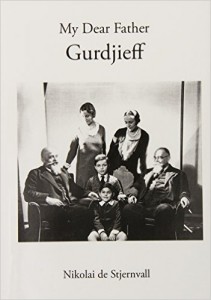 Nikolai de Stjernvall was always close to his “dear father,” G.I. Gurdjieff, but especially so during the few months between 1937 and 1938 when he served as his father’s attendant and collected such rich experiences. As the only person who lived with Gurdjieff to ever write about him, Nikolai’s account is invaluable for providing an intimate and human perspective of his subject unavailable elsewhere. Supplementing his memoirs are two texts by Elizaveta de Stjernvall, his mother, including her account of her trek with Gurdjieff ‘s entourage across the Caucasus evading the Russian Revolution, and Adele Kafian’s account of caring for Katherine Mansfield at Gurdjieff ‘s Institute during her final days. Nikolai’s frankness, Elizaveta’s devotion, and Adele’s compassion are all faithfully maintained in the translation of Paul Beekman Taylor, Nikolai’s boyhood friend who also lived at the Prieuré in his youth.
Nikolai de Stjernvall was always close to his “dear father,” G.I. Gurdjieff, but especially so during the few months between 1937 and 1938 when he served as his father’s attendant and collected such rich experiences. As the only person who lived with Gurdjieff to ever write about him, Nikolai’s account is invaluable for providing an intimate and human perspective of his subject unavailable elsewhere. Supplementing his memoirs are two texts by Elizaveta de Stjernvall, his mother, including her account of her trek with Gurdjieff ‘s entourage across the Caucasus evading the Russian Revolution, and Adele Kafian’s account of caring for Katherine Mansfield at Gurdjieff ‘s Institute during her final days. Nikolai’s frankness, Elizaveta’s devotion, and Adele’s compassion are all faithfully maintained in the translation of Paul Beekman Taylor, Nikolai’s boyhood friend who also lived at the Prieuré in his youth.
Published February 10 2014, Hardcover, 128 pages, ISBN 978-1906834012
- Buy it on Amazon.com
- Buy it on Amazon.co.uk
- Buy it on Book Depository
- Buy it on Barnes & Noble
Nikolai de Stjernvall
(From Gurdjieff Internet Guide)
 Nicholas de Val (Nikolai de Stjernvall) was born in Tbilisi on 28th September 1919 to Elizaveta Grigorievna de Stjernvall and Leonid Robertovich de Stjernvall, both born in Russian Finland. Though his biological father was Georgii Ivanovich Gurdjieff, Leonid, who was several years older than his wife and unable to give her a child, was overjoyed with the birth of a son to his wife. Nikolai was born only a few months after his parents had completed their hazardous journey with Gurdjieff across the Caucasus.
Nicholas de Val (Nikolai de Stjernvall) was born in Tbilisi on 28th September 1919 to Elizaveta Grigorievna de Stjernvall and Leonid Robertovich de Stjernvall, both born in Russian Finland. Though his biological father was Georgii Ivanovich Gurdjieff, Leonid, who was several years older than his wife and unable to give her a child, was overjoyed with the birth of a son to his wife. Nikolai was born only a few months after his parents had completed their hazardous journey with Gurdjieff across the Caucasus.
In July 1920, nine months after his birth, Nikolai and his parents left Russia by boat with Gurdjieff for Constantinople, and a year later by train they accompanied Gurdjieff to Berlin. In July 1922 they accompanied Gurdjieff to Paris and a few weeks later they moved with the entire Gurdjieff entourage to the Prieuré (Priory) in Avon, a suburb of Fontainebleau. Nikolai spent the next ten years there in the company of countless other children, to many of whom he was related by blood. Along with most of the other children of the Prieuré, he attended local schools in Fontainebleau, learning French, though he continued to speak Russian at home with his parents and the other children at the Prieuré.
He was thirteen years old when, after Gurdjieff closed his Institute For the Harmonious Development of Man in late 1932, he moved with his family to a village near Rouen in Normandy, where he completed his schooling. When he was eighteen, Gurdjieff called him to his apartment on the Rue des Colonels Renard to serve as a domestic aid, what Nikolai called appropriately, a “factotum.” He returned to Normandy in 1938 just before Leonid de Stjernvall died of prostate cancer.
When the Second World War broke out in September 1939, he and his mother boarded a ship for Stockholm, and from there to Helsinki. After settling in Helsinki, Nikolai, just barely twenty years of age, Finnish by birth, joined the armed forces in a war against the invading Soviet army. Having learned Finnish, and fluent in French and Russian, he was assigned intelligence tasks in a department attached to Field Marshal Carl Gustav Emil Mannerheim. At the war’s end, he translated for Mannerheim documents into French and, although his mother wanted to return to France, Mannerheim, who was about to leave for Switzerland for medical treatment, helped Nikolai find work as an interpreter for the United Nations in Geneva. In 1948 he and his mother settled in Geneva. Nikolai remained there with his mother until her death. He never married, though he was known as one who appreciated feminine beauty.
Nikolai, like his half-brother Michel de Salzmann, resembled Gurdjieff physically. Unlike Michel he did not follow Gurdjieff’s teachings after the death of his father. Since Michel, a psychiatrist, had a practise in Geneva, and directed a Gurdjieff group there, the two saw each other often. After he retired from freelance interpreting, Nikolai travelled to Canada, England and the United States to visit relatives and close friends such as Boris Mouravieff, Dushka Howarth, and Lida and Luba Gurdjieff. In 1996 Nikolai suffered a stroke, but never lost his mental powers. In 2007 he moved to a retirement home in Veyrier, outside Geneva, where he died on 26 June 2010.